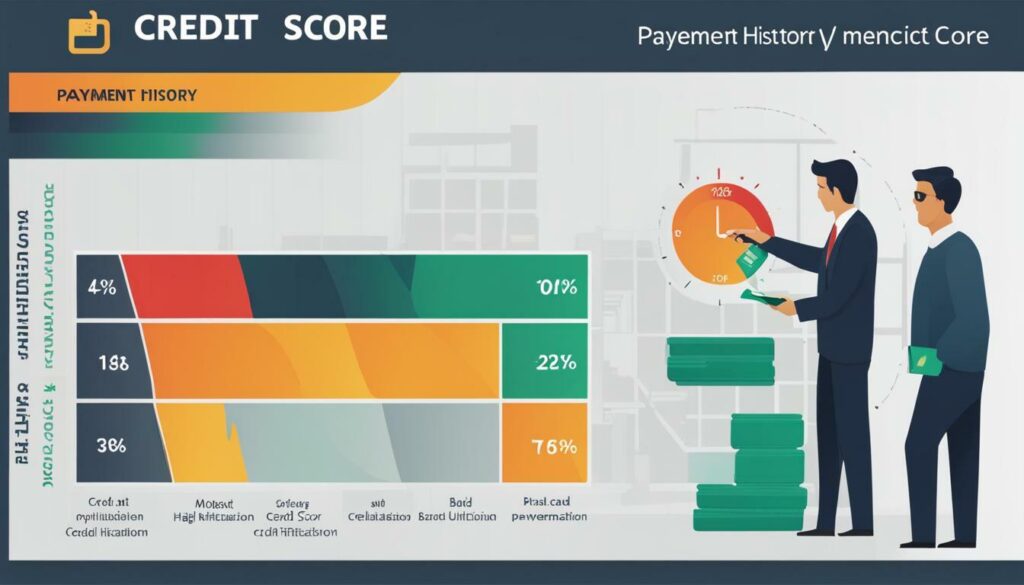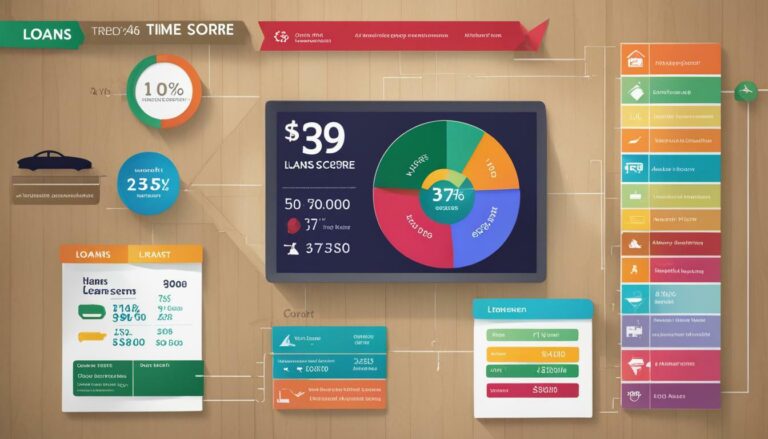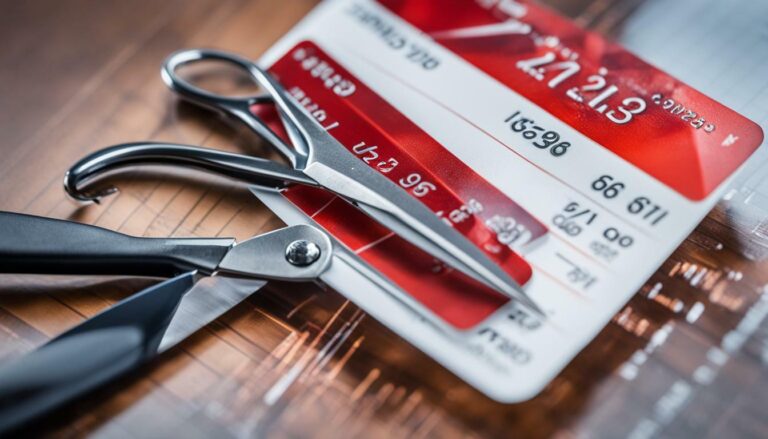Understanding Factors Affecting Your Credit Score Calculation

Your credit score is influenced by various factors that determine your creditworthiness and financial health. It’s important to understand these factors to effectively manage your credit and ensure a favorable credit score. Factors such as payment history, credit utilization, length of credit history, types of credit, and more all play a role in calculating your credit score.
- Payment history and credit utilization are the two most significant factors affecting your credit score.
- Timely bill payments and responsible credit card usage contribute to a favorable credit score.
- The length of your credit history also impacts your credit score, with a longer credit history being advantageous.
- Having a diverse mix of credit types, such as credit cards, loans, and mortgages, can positively impact your credit score.
- Opening multiple new credit accounts within a short period may negatively affect your credit score.
By regularly monitoring your credit reports, you can identify any errors or potential issues that may impact your credit score. Additionally, focusing on timely payments and keeping your credit utilization low can help improve your credit score. It’s also important to note that checking your own credit score does not have a negative impact, and factors such as income and bank balances do not affect your credit scores.
Payment History and Credit Utilization
Timely bill payments and responsible credit card usage play a crucial role in determining your credit score. Payment history refers to your track record of paying bills on time and avoiding late payments. This factor alone makes up around 35% of your credit score. Lenders consider it a strong indicator of your ability to manage credit responsibly. Late payments, delinquencies, or defaults can significantly lower your credit score and make it harder for you to obtain credit in the future.
Credit utilization, on the other hand, accounts for approximately 30% of your credit score. It measures the amount of your total available credit that you’re using. To maintain a good credit score, it’s recommended to keep your credit utilization ratio below 30%. For example, if you have a credit card with a $2,000 limit, try to keep your outstanding balance below $600.
| Payment History | Credit Utilization |
|---|---|
| Paying bills on time | Keeping credit utilization ratio below 30% |
| Avoiding late payments | Managing outstanding balances responsibly |
| Minimizing delinquencies and defaults | Avoiding maxing out credit cards |
By prioritizing timely payments and maintaining low credit utilization, you can positively impact your credit score. These factors are within your control and can be improved by practicing good financial habits. It’s essential to consistently pay your bills by the due date and be mindful of the amount of credit you’re using compared to your available limit.
🚨 TUIC Errors + Low Credit Score?
CreditScoreIQ helps you build credit faster by reporting utility bills to all 3 bureaus—while you dispute errors.
Start Building Credit Today →Takeaways:
- Payment history and credit utilization are two key factors that affect your credit score calculation.
- Payment history contributes around 35% to your score, while credit utilization accounts for approximately 30%.
- Make timely bill payments and avoid late payments to maintain a good payment history.
- Keep your credit utilization ratio below 30% by managing your outstanding balances responsibly.

The length of your credit history influences your credit score, with a longer credit history generally being viewed more favorably by lenders. It provides them with a more comprehensive picture of your credit management habits and reliability over time. When evaluating your creditworthiness, lenders typically look for a proven track record of responsible borrowing and timely repayment.
Your credit history begins with your first credit account, whether it be a credit card, loan, or mortgage. The longer you have these accounts open and in good standing, the more positive impact it can have on your credit score. Lenders value stability and consistency when assessing credit risk, and a longer credit history demonstrates your ability to handle credit responsibly.
It’s important to note that even if you’re new to credit or have a shorter credit history, it doesn’t necessarily mean you’ll have a low credit score. Other factors, such as payment history and credit utilization, also play significant roles in determining your creditworthiness.

Being aware of the importance of maintaining a longer credit history can help guide your credit management decisions. It’s recommended to keep your oldest credit accounts open and active, as closing them can shorten your credit history and potentially impact your credit score. However, it’s equally important to manage your credit responsibly and avoid taking on unnecessary debt. Balancing these factors can help you build a strong credit history and improve your overall creditworthiness.
Types of Credit You Have
The types of credit accounts you have can influence your credit score, with a diverse mix of credit types often deemed more favorable. Lenders consider the variety of credit accounts you manage as an indicator of your ability to handle different types of financial responsibilities. This diversity shows that you can manage different forms of credit responsibly, such as credit cards, loans, and mortgages.
When you have a well-rounded credit history that includes both revolving credit (e.g., credit cards) and installment loans (e.g., car loans or mortgages), it can positively impact your credit score. This is because it demonstrates that you have experience handling different types of credit and can juggle multiple financial obligations effectively.
On the other hand, if you have a limited credit history with only one type of credit account, it may have a slightly negative impact on your score. While having just one type of credit account is not necessarily detrimental, diversifying your credit profile by adding different types of credit can help improve your creditworthiness and overall score.
The Importance of Credit Mix
The variety of credit accounts you have is one of the lesser-weighted factors influencing your credit score. However, maintaining a good credit mix can still contribute to a higher score. Credit scoring models, such as FICO and VantageScore, take into account factors like the number and types of credit accounts you have.
| Type of Credit | Description |
|---|---|
| Revolving Credit | Accounts that have a credit limit and require monthly payments, such as credit cards or lines of credit. |
| Installment Loans | Accounts that involve borrowing a specific amount of money and making fixed monthly payments, such as auto loans or mortgages. |
| Open Accounts | Accounts that must be paid in full each month, such as utility bills or some store credit cards. |
Having a mix of these different credit types can show lenders that you can handle credit responsibly and manage multiple financial obligations. However, it’s important to note that while diversifying your credit mix can positively impact your score, it’s not the sole determining factor. Timely payments, low credit utilization, and other credit scoring factors should also be considered in maintaining a healthy credit profile.

“Having different types of credit can positively impact your credit score and show lenders that you can handle various financial responsibilities effectively.”
Summary
- The types of credit accounts you have can influence your credit score.
- A diverse mix of credit types, such as credit cards, loans, and mortgages, is often regarded as more favorable.
- Credit mix is one of the lesser-weighted factors impacting your credit score, but it can still contribute to a higher score.
- By diversifying your credit profile and responsibly managing different types of credit, you can demonstrate your creditworthiness to lenders.
Length of Time Since You’ve Applied for New Credit
The length of time since you last applied for new credit can impact your credit score, with frequent applications potentially having a negative effect. Credit scoring models take into account the number of recent credit inquiries, as well as the length of time between applications. Applying for multiple new credit accounts within a short period may be seen as a red flag by lenders, as it could indicate financial instability or a higher risk of defaulting on payments.
To maintain a healthy credit score, it’s important to be mindful of how often you apply for new credit. While it’s understandable that you may need to apply for credit in certain situations, such as buying a home or a car, it’s generally a good practice to space out your applications over time.
By spacing out your credit applications, you allow for a longer period of time between inquiries, which can have a positive impact on your credit score. Lenders may view a longer gap between applications as a sign of stability and responsibility. This demonstrates that you’re not consistently seeking additional credit and are more likely to manage your current credit obligations effectively.
| Actions | Impact on Credit Score |
|---|---|
| Applying for new credit frequently | Negative |
| Spacing out credit applications | Positive |
It’s important to note that the impact of recent credit inquiries on your credit score diminishes over time. As time passes and more positive credit behavior is established, the effect of previous inquiries will lessen. So, even if you have recently applied for new credit, focusing on responsible credit management going forward can help improve your credit score over time.
Remember, it’s not just about the number of credit applications you make but also the overall health of your credit profile. Being proactive in managing your existing credit accounts, making timely payments, and keeping your credit utilization low are equally important factors to consider for maintaining a strong credit score.

The length of time since you’ve applied for new credit is just one of the many factors that impact your credit score calculation. Understanding these factors and taking proactive steps to manage your credit effectively are key to maintaining a healthy credit profile.
Total Balances and Debt
The total balances you owe and your overall debt play a role in determining your credit score, with high levels of debt potentially having a negative impact. When calculating your credit score, lenders consider the amount of debt you owe in comparison to your total available credit. This is known as your credit utilization ratio. A high credit utilization ratio, meaning you are using a large portion of your available credit, can indicate financial strain and may lower your credit score.
To maintain a healthy credit score, it is important to keep your total balances and debt at manageable levels. You can do this by regularly monitoring your credit card balances and paying down your debts in a timely manner. By doing so, you can gradually reduce your credit utilization ratio and improve your credit score.
Here’s an example of how credit utilization ratio is calculated:
| Total Credit Limit | Outstanding Balance | Credit Utilization Ratio |
|---|---|---|
| $10,000 | $2,000 | 20% |
In the example above, the individual has a total credit limit of $10,000 and an outstanding balance of $2,000. Their credit utilization ratio would be calculated by dividing the outstanding balance by the total credit limit ($2,000 / $10,000) and multiplying it by 100 to get the percentage (20%).
By understanding the impact of total balances and debt on your credit score, you can make informed financial decisions to improve your creditworthiness and achieve your financial goals.

Regularly monitoring your credit reports is crucial in ensuring the accuracy of your credit information and identifying any discrepancies that may impact your credit score. By reviewing your credit reports, you can verify that all the information reported is correct and up-to-date. This includes checking for any errors or inaccuracies, such as incorrect personal information, accounts that don’t belong to you, or negative information that should have been removed.
To monitor your credit reports, you can request free copies from each of the three major credit bureaus – Equifax, Experian, and TransUnion – once a year. Alternatively, you can use a credit monitoring service that provides regular updates on your credit reports and alerts you to any changes or suspicious activity. These services can also help you keep track of your credit score and provide insights into how certain actions may impact your score.
When reviewing your credit reports, pay close attention to any potential red flags, such as accounts you don’t recognize or unexplained changes to your credit limit. If you spot any inaccuracies or suspicious activity, it’s important to take immediate action. Contact the credit bureaus to dispute incorrect information and report any fraudulent activity to the appropriate authorities.
Benefits of Regular Credit Report Monitoring
- Ensures the accuracy of your credit information
- Helps you identify and resolve errors or discrepancies
- Protects against identity theft and fraud
- Allows you to stay informed about your credit standing
By regularly monitoring your credit reports, you can stay on top of your credit health and take proactive steps to maintain a good credit score. This includes paying your bills on time, keeping your credit utilization low, and managing your debt responsibly.
| Credit Report Monitoring Checklist |
|---|
| Review your credit reports at least once a year |
| Check for any errors or inaccuracies |
| Look out for signs of identity theft or fraudulent activity |
| Consider using a credit monitoring service for real-time updates |
As the saying goes, “knowledge is power.” By staying informed about your credit and monitoring your credit reports, you can make informed decisions and take proactive steps to build and maintain a healthy credit profile.

To improve your credit scores, it is essential to prioritize timely payments of your bills and maintain low credit utilization. These two factors have a significant impact on your overall credit health.
Firstly, payment history plays a crucial role in determining your credit score. Consistently making timely payments and avoiding late payments and defaults demonstrate your financial responsibility to lenders. It shows that you are a reliable borrower who can be trusted with credit. A single late payment can lower your credit score, so it is important to pay your bills on time, every time.
Secondly, credit utilization refers to the amount of your available credit that you are currently using. It is recommended to keep your credit utilization ratio below 30% to maintain a good credit score. This means that if you have a credit limit of $10,000, you should aim to keep your outstanding balances below $3,000. Keeping your credit utilization low shows lenders that you are managing your credit responsibly and not relying heavily on credit.
By focusing on timely payments and low credit utilization, you can improve your credit scores over time. It is important to be consistent in your efforts and establish good credit habits. Set up automatic payments or reminders to ensure you never miss a payment, and regularly review your credit card statements to keep track of your credit utilization. Taking these proactive steps will help you maintain a healthy credit profile and open doors for better borrowing opportunities in the future.

| Timely Payments | Low Credit Utilization |
|---|---|
| Makes you a reliable borrower | Shows responsible credit management |
| Helps maintain a good credit score | Keeps credit utilization ratio low |
| A single late payment can lower your score | Recommended to keep ratio below 30% |
Remember, improving your credit scores takes time and consistent effort. Prioritize timely payments and manage your credit utilization responsibly to build a strong credit history.
Checking Your Own Credit Score
Checking your own credit score does not harm your credit rating; in fact, it is an essential practice for understanding your financial health. By regularly monitoring your credit score, you can stay informed about any changes or potential issues that may arise. It also allows you to take proactive measures to improve your score, if necessary.
There are several ways to check your credit score. You can request a free copy of your credit report from each of the three major credit bureaus – Experian, Equifax, and TransUnion – once every 12 months. The Fair Credit Reporting Act (FCRA) ensures that you have access to these reports to review your credit history and detect any errors or inaccuracies.
Additionally, many financial institutions and credit card companies provide credit score monitoring services, allowing you to check your score regularly. These services often include features such as credit score tracking, credit monitoring alerts, and identity theft protection.
| Benefits of Checking Your Credit Score |
|---|
| 1. Identify and correct errors on your credit report |
| 2. Detect signs of identity theft or fraudulent activity |
| 3. Understand how your financial actions impact your credit |
| 4. Take steps to improve your credit score |
Remember, checking your own credit score is a responsible financial practice that can help you make informed decisions and maintain a healthy credit profile. Take advantage of the resources available to you to stay on top of your credit score and ensure your financial well-being.

It is important to understand that factors such as income and bank balances do not have a direct impact on your credit scores. Your credit score is primarily based on your credit history and how you manage your debts. While income may play a role in determining your eligibility for certain loans, it is not a factor considered in credit score calculations. Similarly, the amount of money you have in your bank accounts does not affect your credit scores.
So, why do income and bank balances not influence your credit scores? This is because credit scores are designed to measure your creditworthiness and how likely you are to repay your debts. They evaluate factors such as your payment history, credit utilization, length of credit history, types of credit, and recent credit applications. These factors provide a more accurate representation of your credit management skills and how responsible you are with credit.
While income and bank balances may not directly impact your credit scores, they can indirectly affect your ability to obtain credit. Lenders may consider your income when determining your repayment ability, and having sufficient funds in your bank accounts can help demonstrate financial stability. However, these factors are not reflected in your credit scores themselves.
Factors That Do Not Affect Your Credit Scores:
| Factor | Explanation |
|---|---|
| Income | Your income does not directly impact your credit scores, but it may be considered by lenders when assessing your creditworthiness and ability to repay debts. |
| Bank Balances | The amount of money you have in your bank accounts does not affect your credit scores. However, it can indirectly influence your eligibility for certain loans. |
Remember, your credit scores are primarily based on your credit history and how you manage your debts. Focus on maintaining a positive payment history, keeping your credit utilization low, and managing your credit responsibly for the best credit score outcomes.
Understanding the factors that do and do not impact your credit scores is crucial for effectively managing your credit. By focusing on the factors that matter, such as payment history and credit utilization, you can take proactive steps to improve your creditworthiness. So, while income and bank balances are important for your overall financial well-being, they do not directly influence your credit scores.

Credit scores are calculated using sophisticated formulas and algorithms that take into account various factors influencing your creditworthiness. These formulas and algorithms, designed by credit bureaus and scoring models, analyze your credit history and financial behaviors to generate a numeric representation of your creditworthiness. Understanding the factors considered in these calculations can help you make informed decisions to improve your credit scores.
One important aspect of credit score calculation is determining the weightage assigned to each factor. While the exact formulas used by credit bureaus and scoring models are proprietary and not publicly disclosed, research and industry knowledge have shed light on the general factors impacting credit score calculation.
| Credit Score Factors | Description |
|---|---|
| Payment History | Timely bill payments and a history of responsible credit management. |
| Credit Utilization | The percentage of your available credit limit that you use. |
| Length of Credit History | The age of your oldest and newest credit accounts, as well as the average age of all accounts. |
| Types of Credit You Have | A mix of credit accounts, such as credit cards, loans, and mortgages, demonstrating your ability to manage different types of credit. |
| Length of Time Since You’ve Applied for New Credit | The duration since your most recent credit applications. |
| Total Balances and Debt | The total amount of debt you owe and the proportion of balances to credit limits. |
It is important to note that these factors are not equally weighted in credit score calculations. Payment history and credit utilization typically have the most significant impact, collectively accounting for more than half of your credit score. Other factors, while still important, have a relatively smaller influence.

By understanding the factors that influence your credit score calculation, you can take proactive steps to improve your creditworthiness. This may include making timely payments, maintaining low credit utilization, diversifying your credit mix, and effectively managing your debt. Regularly monitoring your credit reports for errors or discrepancies is also crucial.
Remember, checking your own credit score does not negatively impact it, so take advantage of the free annual credit reports and credit monitoring services available to you. And while factors such as your income and bank balances do not directly affect your credit scores, they can still play a role in lenders’ decision-making processes when considering your credit applications.
Conclusion
Understanding the factors that influence credit score calculation empowers you to take control of your financial health and make informed decisions to improve your creditworthiness. Payment history and credit utilization are the most critical factors impacting your credit scores, accounting for over half of the calculation. It is essential to maintain a record of timely bill payments and responsibly manage the amount of credit you use.
In addition to payment history and credit utilization, other factors such as the length of your credit history, the types of credit you have, the length of time since you’ve applied for new credit, and your total balances and debt also impact your credit scores, although to a lesser extent.
In order to improve your credit scores, it is crucial to regularly monitor your credit reports for any errors or potential issues. By reviewing your reports and addressing any discrepancies, you can ensure that your credit profile remains accurate and up-to-date. Additionally, focusing on paying bills on time and keeping your credit utilization low are fundamental strategies for improving your creditworthiness.
Finally, it’s important to note that checking your own credit score does not have a negative impact on your score. You can access your credit reports for free annually and take advantage of credit monitoring services to stay informed about any changes or potential concerns. It’s worth noting that factors such as income and bank balances do not affect your credit scores. Instead, the focus should be on building a positive credit history through responsible credit management.
FAQ
What are the factors that affect credit score calculation?
Payment history and credit utilization are the two most important factors that impact credit scores. Other factors include the length of your credit history, the types of credit you have, the length of time since you’ve applied for new credit, and your total balances and debt.
How does payment history affect my credit score?
Paying bills on time and avoiding late payments contribute to a positive credit score. Timely bill payments show lenders that you are responsible and trustworthy with credit.
What is credit utilization, and how does it affect my credit score?
Credit utilization refers to the amount of your credit limit that you use. It is recommended to keep your credit utilization below 30% to maintain a good credit score. High credit utilization can indicate a reliance on credit and may negatively impact your score.
Why is the length of my credit history important for my credit score?
Having a longer credit history demonstrates your ability to manage credit over time. A longer credit history can positively affect your credit score, as it provides more data for lenders to assess your creditworthiness.
How does the types of credit I have impact my credit score?
Having a diverse mix of credit accounts, such as credit cards, loans, and mortgages, can contribute to a higher credit score. It shows that you can handle different types of credit responsibly.
Does the frequency of applying for new credit affect my credit score?
Yes, applying for multiple new credit accounts within a short period can negatively impact your credit score. It may be seen as a sign of financial instability and increase the risk associated with lending to you.
How do my total balances and overall debt affect my credit score?
High total balances and excessive debt can lower your credit score. It is important to manage your debt levels responsibly and avoid carrying high balances on your credit accounts.
Why is it necessary to regularly monitor my credit reports?
Regularly monitoring your credit reports allows you to identify and correct any errors or discrepancies. It also helps you stay aware of any potential issues that could affect your credit score.
What should I focus on to improve my credit scores?
To improve your credit scores, focus on making timely payments and keeping your credit utilization low. Consistently paying bills on time and using credit responsibly can have a positive impact on your scores.
Does checking my own credit score affect my score?
No, checking your own credit score does not impact your score negatively. You can check your credit score without any penalty and take advantage of free annual credit reports and credit monitoring services.
Do factors like income and bank balances affect my credit scores?
No, factors like income and bank balances do not impact your credit scores. Credit scores are based on credit-related information, such as your payment history and credit utilization.
How is credit score calculation determined?
Credit scores are determined using complex formulas and algorithms. These calculations take into account factors like payment history, credit utilization, credit history length, types of credit, and other variables to determine your credit score.
Ready to Improve Your Credit?
Disputing TUIC errors is step one. Step two? Boost your score by reporting utility payments with CreditScoreIQ.
Get Started Now (Only $1 Trial) →3-bureau reporting • $1M identity insurance • Dark web monitoring






